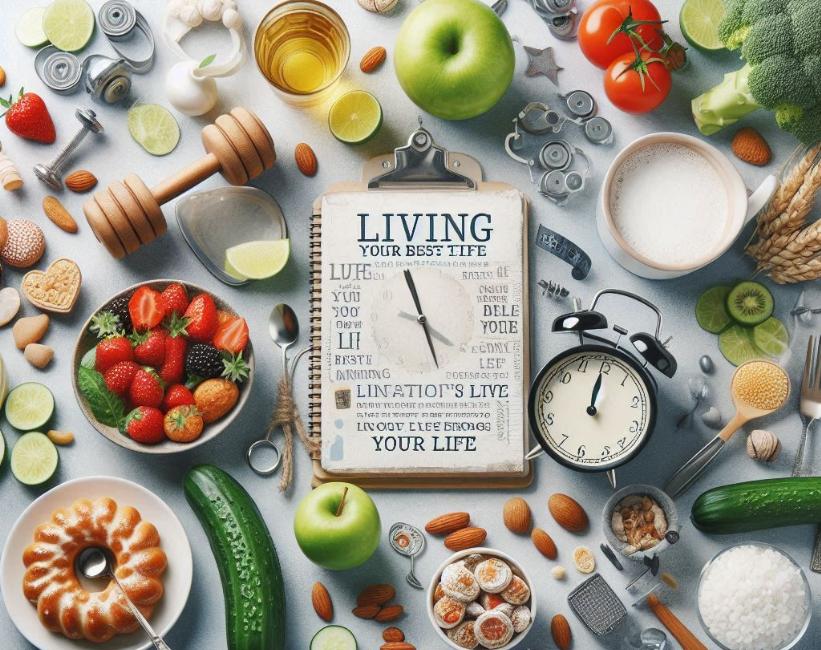Living Your Best Life: Tips for a Healthy Lifestyle
What It Means to Live Your Best Life
Living your best life means finding happiness, health, and purpose in everything you do. It’s about making choices that help you feel good both inside and out. But what does it really mean to live your best life? Let’s break it down into a few important ideas.
Defining Your Best Life
Everyone’s idea of the best life is different because we all have unique dreams and goals. Some people might think living their best life means being super healthy, while others might focus on being successful in their job or having strong friendships. To figure out what your best life looks like, start by thinking about what makes you truly happy. Is it spending time with family, learning new things, or maybe being outdoors? Once you know what makes you happy, you can start working towards it every day.
Health and Happiness Connection
Being healthy is a big part of living your best life. When your body feels good, it’s easier to be happy and enjoy the things you love. Eating nutritious food, staying active, and getting enough sleep all help keep your body strong and your mind clear. When you take care of your health, you’re also taking care of your happiness.
The Power of a Positive Mindset
Your mindset, or the way you think about things, has a big impact on your life. If you focus on the good things in your life and stay positive, you’ll find it easier to overcome challenges and stay motivated. Even when things don’t go as planned, having a positive attitude can help you bounce back and keep moving forward. Remember, living your best life isn’t about everything being perfect all the time—it’s about making the best out of every situation.
Setting Goals That Matter
Setting goals is like making a plan for your life. Goals give you direction and something to work towards. To live your best life, it’s important to set goals that really matter to you. Start with small, achievable goals that bring you closer to your bigger dreams. For example, if you want to be healthier, your goal could be to eat one extra serving of vegetables each day or take a short walk every afternoon. As you reach these small goals, you’ll build confidence and be ready to take on bigger challenges.
By understanding these key ideas, you can start to see what living your best life means for you. It’s a journey that involves making healthy choices, staying positive, and working towards goals that bring you happiness.
Nourishing Your Body with a Balanced Diet
Eating a balanced diet is one of the most important steps you can take to live your best life. When you give your body the right kind of fuel, it works better, and you feel stronger and more energetic. Let’s explore how you can nourish your body by making smart food choices.
Basics of a Balanced Diet
A balanced diet means eating a variety of foods that give your body all the nutrients it needs. These nutrients include proteins, carbohydrates, fats, vitamins, and minerals. Think of your meals like a colorful plate—lots of different colors usually means you’re getting lots of different nutrients. For example, a plate with vegetables, fruits, whole grains, and a bit of protein like chicken or beans is a good way to make sure you’re eating a balanced diet.
Essential Nutrients You Need
Your body needs certain nutrients to stay healthy. Proteins help build and repair muscles, while carbohydrates give you energy. Healthy fats are important for your brain and heart, and vitamins and minerals keep your body functioning properly. For example, calcium from milk or leafy greens helps build strong bones, and vitamin C from oranges or strawberries helps your body heal and fight off sickness. By eating a variety of foods, you can get all these essential nutrients.
Adding More Fruits and Veggies
Fruits and vegetables are packed with vitamins, minerals, and fiber, which are great for your body. They also help keep you full and satisfied without adding too many calories. Try to add more fruits and veggies to every meal. You can start by adding a banana to your breakfast, having a salad with lunch, or snacking on carrot sticks in the afternoon. The more colors on your plate, the better!
Choosing Whole Foods Over Processed
Whole foods are foods that are as close to their natural form as possible, like fresh fruits, vegetables, whole grains, nuts, and lean meats. Processed foods, on the other hand, have been changed in some way, often by adding sugar, salt, or unhealthy fats. Eating more whole foods and fewer processed foods is better for your health. For example, choosing an apple instead of apple-flavored snacks or opting for whole-grain bread instead of white bread are small changes that can make a big difference.
Easy Meal Planning Tips
Planning your meals ahead of time can help you make healthier choices and avoid the temptation of unhealthy snacks. Start by making a simple meal plan for the week. Choose recipes that include plenty of vegetables, lean proteins, and whole grains. You can even prepare some meals in advance so they’re ready when you need them. This way, you won’t have to worry about what to eat, and you’ll be more likely to stick to your healthy eating goals.
By following these simple tips, you can nourish your body with a balanced diet that helps you feel your best every day. Eating well doesn’t have to be complicated—just focus on making healthy, whole food choices and enjoy the benefits of a stronger, healthier body.
The Benefits of Regular Exercise
Regular exercise is essential for living your best life. It helps keep your body strong, your mind sharp, and your mood positive. Let’s look at how different types of exercise can benefit you and how to make it a regular part of your routine.
Exercise for All Fitness Levels
No matter your age or fitness level, there’s an exercise that’s right for you. If you’re just starting out, you might begin with simple activities like walking, stretching, or riding a bike. As you get stronger, you can try more challenging exercises like jogging, swimming, or lifting weights. The key is to find something you enjoy so that it’s easier to stick with it. Remember, every little bit counts, so even a short walk around the block is a great start!
Creating a Workout Routine
Having a regular workout routine helps you stay on track and makes exercise a habit. Start by setting aside a specific time each day for physical activity. You can begin with just 10-15 minutes and gradually increase the time as you get more comfortable. Your routine can include a mix of activities like cardio (walking, running), strength training (lifting weights, doing push-ups), and flexibility exercises (yoga, stretching). Mixing it up keeps things interesting and works different parts of your body.
Boosting Mental Health with Exercise
Exercise isn’t just good for your body; it’s also great for your mind. When you exercise, your brain releases chemicals called endorphins, which make you feel happier and less stressed. Regular physical activity can help reduce anxiety, improve your mood, and even help you sleep better at night. If you’re feeling down or stressed, a quick workout can be just the thing to lift your spirits and clear your mind.
Staying Motivated to Move
Staying motivated to exercise can be tough, especially when you’re busy or tired. One way to keep going is to set small, achievable goals, like walking a certain number of steps each day or trying a new exercise each week. It can also help to find a workout buddy—someone who will encourage you and make exercising more fun. Remember to celebrate your progress, no matter how small, and don’t be too hard on yourself if you miss a day. What’s important is getting back on track and keeping a positive attitude.
Consistency is Key
The most important thing about exercise is being consistent. Regular physical activity, even in small amounts, is much better than doing a lot at once and then stopping. Find a routine that works for you and stick with it. Whether it’s a daily walk, a weekend hike, or a few minutes of stretching each morning, consistency will help you build strength, improve your fitness, and feel better overall.
By making exercise a regular part of your life, you’ll enjoy a wide range of benefits, from better physical health to improved mental well-being. It’s one of the best ways to ensure that you’re living your best life, every day.
Prioritizing Mental Health and Mindfulness
Taking care of your mental health is just as important as taking care of your body. When your mind is healthy, you can handle stress better, think more clearly, and enjoy life more fully. Let’s explore some ways to prioritize your mental well-being and practice mindfulness in your daily life.
Spotting Stress and Anxiety
It’s normal to feel stressed or anxious sometimes, but it’s important to recognize when these feelings are becoming too much. Stress can show up in different ways, like feeling tired all the time, having trouble sleeping, or getting headaches. Anxiety might make you feel worried or scared, even when there’s no real danger. By noticing these signs early, you can take steps to manage them before they get worse.
Simple Mindfulness Practices
Mindfulness means paying attention to the present moment without worrying about the past or the future. It’s a great way to calm your mind and reduce stress. You can practice mindfulness in many ways, like taking a few deep breaths when you feel tense, focusing on the sounds around you, or simply noticing how your body feels. Even a few minutes of mindfulness each day can make a big difference in how you feel.
Meditation for Better Mental Health
Meditation is another powerful tool for improving mental health. It involves sitting quietly and focusing your mind on something simple, like your breathing or a calming word. Meditation can help reduce stress, improve concentration, and make you feel more at peace. You don’t need to meditate for a long time—even five or ten minutes a day can help. There are many apps and videos that can guide you if you’re not sure where to start.
Managing Stress Effectively
When stress builds up, it can affect your mood, your health, and how you interact with others. That’s why it’s important to find healthy ways to manage stress. This might include doing something you enjoy, like reading, listening to music, or spending time with friends. Exercise, mindfulness, and meditation can also help lower stress levels. Remember, it’s okay to take breaks and give yourself time to relax.
When to Seek Help
Sometimes, managing stress or anxiety on your own isn’t enough, and that’s okay. If you’re feeling overwhelmed, talking to someone you trust, like a friend, family member, or teacher, can help. There are also professionals, like counselors or therapists, who are trained to help you work through difficult emotions. Asking for help is a sign of strength, not weakness, and it’s an important part of taking care of your mental health.
The Importance of Quality Sleep
Getting enough quality sleep is essential for living your best life. Sleep helps your body heal, gives you energy, and improves your mood. Let’s look at why sleep is so important and how you can make sure you’re getting the rest you need.
How Much Sleep is Enough?
Different people need different amounts of sleep, but most kids need about 9-11 hours each night, while adults usually need 7-9 hours. Getting enough sleep helps you feel alert, focused, and ready to take on the day. If you’re feeling tired during the day, you might not be getting enough sleep at night.
Creating a Sleep-Friendly Space
Where you sleep can have a big impact on how well you sleep. To create a sleep-friendly space, make sure your room is quiet, dark, and cool. A comfortable bed and pillow are also important. Try to keep your bedroom for sleeping only—avoid doing homework or playing video games in bed, so your brain knows it’s time to relax when you lie down.
Sleep and Your Overall Health
Good sleep is important for your overall health. When you sleep, your body repairs itself, your brain processes information, and your immune system gets stronger. Poor sleep can lead to problems like trouble concentrating, mood swings, and even getting sick more often. That’s why it’s so important to make sleep a priority.
Dealing with Sleep Disorders
Sometimes, even when you try your best, sleep doesn’t come easily. If you have trouble falling asleep, staying asleep, or waking up too early, you might have a sleep disorder. Conditions like insomnia, sleep apnea, or restless leg syndrome can make it hard to get the rest you need. If you think you might have a sleep disorder, it’s a good idea to talk to a doctor who can help you find solutions.
Benefits of a Sleep Routine
Having a regular sleep routine can help you fall asleep faster and sleep better. Try to go to bed and wake up at the same time every day, even on weekends. Before bed, do something relaxing, like reading a book or taking a warm bath, to help your body wind down. Avoid screens and caffeine before bedtime, as they can make it harder to sleep. With a good sleep routine, you’ll wake up feeling refreshed and ready to start your day.
Prioritizing mental health and getting quality sleep are both crucial steps in living your best life. By taking care of your mind and ensuring you get enough rest, you’ll be better equipped to handle whatever challenges come your way and enjoy the good moments even more.
Building Strong Social Connections
Having strong social connections is a key part of living your best life. Good relationships with family, friends, and your community can make you happier, healthier, and more fulfilled. Let’s explore how to build and maintain these important connections.
Relationships and Healthy Living
Your relationships play a big role in your overall well-being. Spending time with people you care about can boost your mood, reduce stress, and even help you live longer. Positive social connections can give you support when you need it and make the good times even better. It’s important to surround yourself with people who lift you up and make you feel valued.
Making Meaningful Friendships
Friendships are special relationships that can bring joy and comfort into your life. To build meaningful friendships, be open to meeting new people and showing kindness and respect. Listen to others, share your thoughts, and be there for your friends when they need you. It’s not about having lots of friends; it’s about having a few close friends who truly care about you.
Strengthening Family Bonds
Family is often the first social connection we experience, and these relationships can be the most enduring. Strengthening family bonds can be as simple as spending quality time together, communicating openly, and showing appreciation for each other. Whether it’s playing a game, having a meal together, or just talking about your day, these moments help build strong family connections.
Networking for Growth
Networking isn’t just for adults in the workplace—it’s about building connections that can help you learn and grow. Whether it’s joining a club, participating in community events, or connecting with others who share your interests, networking can open up new opportunities and help you develop new skills. It’s a way to expand your social circle and learn from others.
Overcoming Loneliness
Even with lots of people around, it’s possible to feel lonely. If you’re feeling lonely, try reaching out to someone you trust, joining a group activity, or volunteering in your community. Connecting with others who share your interests or values can help you feel less isolated. Remember, it’s okay to ask for help if you’re struggling with loneliness—it’s a common feeling, and there are many ways to overcome it.
The Health Impact of Staying Hydrated
Staying hydrated is essential for good health. Your body needs water to function properly, and drinking enough fluids can keep you feeling your best. Let’s look at why hydration is important and how you can make sure you’re drinking enough water each day.
How Much Water You Need
The amount of water you need can vary depending on your age, activity level, and the weather. A good rule of thumb is to drink about 8 glasses of water a day, but you might need more if you’re active or it’s hot outside. Paying attention to your body’s signals, like feeling thirsty or having dry lips, can help you know when it’s time to drink more.
Benefits of Staying Hydrated
Water does a lot for your body. It helps keep your skin healthy, your joints lubricated, and your organs working properly. Staying hydrated also helps your brain function better, which can improve your focus and mood. When you’re well-hydrated, you have more energy, and your body can handle physical activity better.
Signs You’re Dehydrated
Dehydration happens when your body doesn’t have enough water to function properly. Common signs include feeling thirsty, having a dry mouth, feeling tired, or getting headaches. In more severe cases, dehydration can cause dizziness or confusion. If you notice these signs, it’s important to drink water right away and avoid dehydration.
Fun Ways to Drink More Water
Sometimes it can be hard to drink enough water, especially if you’re not used to it. To make it easier, try adding a slice of lemon or a few berries to your water for a bit of flavor. You can also eat water-rich foods like cucumbers, oranges, and watermelon to help stay hydrated. Carrying a water bottle with you throughout the day can also remind you to drink more often.
Hydration and Weight Management
Drinking water can also help with weight management. Sometimes when you feel hungry, your body is actually thirsty, so drinking water can help curb unnecessary snacking. Water is also calorie-free, making it a great choice if you’re trying to manage your weight. Plus, staying hydrated helps your body process food more efficiently and supports healthy digestion.
Cultivating Positive Habits for Lasting Change
Building positive habits is a powerful way to improve your life and achieve your goals. Habits are actions you do regularly, and when they’re good ones, they can make a big difference over time. Let’s explore how to cultivate positive habits that last.
Breaking Bad Habits
Before you can build new habits, it’s important to address any bad habits that might be holding you back. Bad habits can be things like staying up too late, eating too much junk food, or spending too much time on screens. To break a bad habit, start by understanding why you do it and then find a healthier alternative. For example, if you snack when you’re bored, try going for a walk or reading a book instead.
Building Healthy New Habits
Creating new, healthy habits is all about starting small and being consistent. Whether it’s eating more vegetables, exercising regularly, or practicing mindfulness, pick one habit to focus on at a time. Set a small, achievable goal, like eating a piece of fruit every day or taking a 10-minute walk. As this habit becomes part of your routine, you can add more healthy habits to your list.
Science of Habit Formation
Habits form through repetition, and it usually takes about 21 to 30 days for a new behavior to become automatic. The more you repeat a positive action, the easier it becomes. Your brain starts to recognize the new habit as part of your daily routine, and soon you’ll do it without even thinking. Understanding this process can help you stay patient and persistent as you work to build new habits.
Sticking to Your New Habits
Sticking to new habits can be challenging, especially in the beginning. It helps to remind yourself why the habit is important to you and to celebrate your progress along the way. If you miss a day, don’t get discouraged—just get back on track as soon as you can. Keeping a journal or tracking your progress with a calendar can also help you stay motivated.
Long-Term Benefits of Positive Changes
The positive changes you make today can have long-lasting benefits for your health and happiness. Over time, your new habits will become second nature, and you’ll start to see the results in how you feel and live. Whether it’s more energy, better mood, or improved health, the long-term benefits of positive habits are well worth the effort.
By building strong social connections, staying hydrated, and cultivating positive habits, you’ll be well on your way to living your best life. These steps will help you feel more connected, energized, and in control of your health and happiness.
Managing Stress for a Peaceful Life
Stress is a part of life, but learning how to manage it can help you live more peacefully and enjoy each day. By finding ways to handle stress effectively, you can keep it from affecting your health and happiness. Let’s explore some simple strategies for managing stress.
Recognizing Stress Triggers
The first step in managing stress is understanding what causes it. Stress triggers can be different for everyone—things like schoolwork, family issues, or even too many activities can all cause stress. By recognizing your triggers, you can start to find ways to avoid them or deal with them more calmly. For example, if you get stressed about homework, try breaking it down into smaller tasks and tackling them one at a time.
Relaxation Techniques
Relaxation techniques are simple practices that help calm your mind and body. Deep breathing is one of the easiest—just take slow, deep breaths in through your nose and out through your mouth. You can also try progressive muscle relaxation, where you tense and then relax different muscle groups in your body. Listening to calming music, taking a warm bath, or spending time in nature are also great ways to relax and reduce stress.
Time Management Tips
Good time management can help you avoid the stress that comes from feeling overwhelmed. Start by making a schedule for your day or week, listing the tasks you need to do and when you’ll do them. Prioritize the most important tasks and tackle them first. Make sure to include breaks and time for relaxation in your schedule. By managing your time well, you can reduce stress and feel more in control of your life.
Positive Thinking and Stress
Your thoughts have a big impact on how you feel. Positive thinking means focusing on the good things in your life and not letting negative thoughts take over. When you face a challenge, try to see it as an opportunity to learn and grow, rather than something to worry about. Surrounding yourself with positive people and practicing gratitude—thinking about what you’re thankful for—can also help reduce stress.
Healthy Ways to Cope
Everyone needs ways to cope with stress, but some ways are healthier than others. Instead of turning to unhealthy habits like overeating or avoiding problems, try coping strategies that benefit your body and mind. Exercise is a great way to burn off stress, and talking to a friend can help you feel supported. Finding a hobby or creative outlet, like drawing or playing music, can also be a healthy way to deal with stress.
The Power of Gratitude and Positivity
Practicing gratitude and maintaining a positive outlook can transform your life. By focusing on the good things and appreciating what you have, you can boost your happiness and well-being. Let’s explore the power of gratitude and how you can make it a daily habit.
What is Gratitude?
Gratitude is the feeling of thankfulness and appreciation for the good things in your life. It can be something big, like your family and friends, or something small, like a sunny day or a tasty meal. Practicing gratitude means taking the time to notice and be thankful for these things. It helps you focus on the positive and can make you feel happier and more content.
Benefits of Being Thankful
Being thankful has many benefits for your mind and body. It can improve your mood, reduce stress, and even make your relationships stronger. When you focus on what you’re grateful for, it’s easier to stay positive, even when things aren’t perfect. Studies have shown that people who practice gratitude regularly are often healthier, sleep better, and feel more connected to others.
Keeping a Gratitude Journal
One of the best ways to practice gratitude is by keeping a gratitude journal. Each day, write down a few things you’re thankful for. They can be big or small, as long as they make you feel good. Over time, you’ll start to notice more and more things to be grateful for, and your overall outlook on life may become more positive. Reading through your journal on tough days can also remind you of all the good in your life.
Spreading Positivity
Spreading positivity means sharing your good thoughts and feelings with others. You can do this by giving compliments, offering help, or simply being kind and patient. When you’re positive, it not only makes you feel good, but it can also brighten someone else’s day. Acts of kindness, no matter how small, can have a big impact on those around you and help create a more positive environment.
Building a Positive Mindset
Building a positive mindset takes practice, but it’s worth the effort. Start by challenging negative thoughts and replacing them with more positive ones. For example, if you catch yourself thinking, “I can’t do this,” try instead, “I’ll give it my best shot.” Surround yourself with positive influences, like supportive friends and uplifting media. Over time, you’ll find it easier to stay optimistic and see the bright side of life.
By managing stress effectively and practicing gratitude and positivity, you can create a more peaceful, joyful, and fulfilling life. These strategies will help you handle challenges with grace and keep your focus on what truly matters.














Post Comment